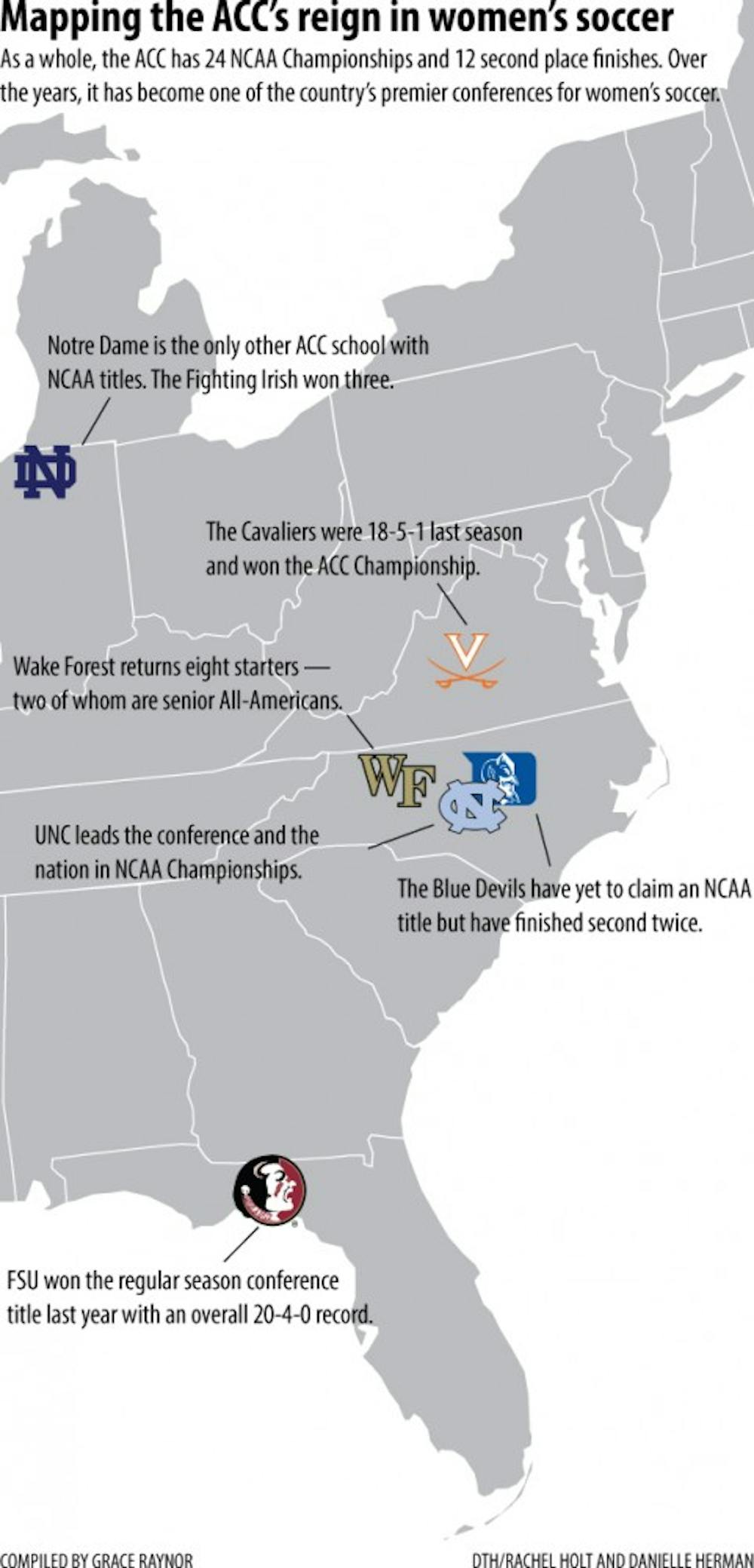“It’s so clearly the best conference. The tough part is to survive the conference with an impressive enough win-loss record to qualify for the NCAA tournament.”
This season, No. 3 Florida State, No. 5 Virginia, No. 7 Notre Dame, No. 10 Wake Forest, No. 12 Duke and No. 15 Maryland are all gunning for the No. 1 Tar Heels. And they aren’t far behind.
Developing conference
Twelve years at Duke — with Dorrance’s dynasty mere miles down the road — have taken their toll on Robbie Church.
“I used not to have gray hair,” the Blue Devils coach said, laughing. “Now I have nothing but gray hair left.”
In head-to-head matchups, Duke has lost 35 of 38 games against the Tar Heels all time. But under Church’s leadership, the Blue Devils have grown to at least rival UNC in the national landscape, making the NCAA tournament in each of the last 10 years and reaching the round of eight in the each of the last four.
Slowly but surely, Church is pushing Duke out of Dorrance’s shadow.
“A lot of people are like, ‘Oh my gosh. What’s it like?’ But nobody respects them more than we do,” Church said. “We want to do what they’ve done. We want to be at that level, and they’ve helped us get close to that level. They’ve helped a lot of teams in this league.”
Florida State, in particular, has evolved into a perennial force under coach Mark Krikorian, making the College Cup five of his eight years at the helm, including last season.
“I think it’s a lot about consistency,” Krikorian said. “Here the idea is to compete for a national championship every year.”
In 2011, the Seminoles dealt UNC its first-ever loss in the ACC Tournament in what was a hallmark year for ACC teams not dressed in light blue.
FSU, along with Duke and Wake Forest, made up three-fourths of the final four that year. In 2012, nine ACC teams made the NCAA tournament with all but one advancing to at least the second round.
To get the day's news and headlines in your inbox each morning, sign up for our email newsletters.
Still, no non-UNC ACC team has yet crossed the final threshold: a national title.
Duke came close in 2011, losing to Stanford in the title game. Church said returning last season with most of his roster intact gave him a sense of what it’s like to compete under the national microscope.
“I’ve always had a great deal of respect for Anson and his staff,” Church said. “I have much more after going through a season like that where everybody’s chasing you and you’re the big game on everybody’s schedule.
“I don’t know how they’ve done it.”
Staying on top
Belgium, Kenya, Ethiopia, Singapore, Switzerland and India have all been home to Dorrance throughout his life.
It was overseas where Dorrance was first exposed to the game of soccer. The coach continues to draw from outside influences as he hones his ever-developing coaching technique.
“The coaching profession is about your evolution as much as it is about helping your players evolve,” Dorrance said, “and I hope I’ve done a good job of staying on the cutting edge of the world game.”
As the field is strengthening around him, Dorrance has had no choice but to evolve.
The core of Dorrance’s on-field strategy has long been an aggressive scheme that emphasizes offense first. But in 2011, Dorrance added a more defensive-minded formation from the French national team to his arsenal.
“Just me personally, I’ve never had a set position,” said reigning National Player of the Year Crystal Dunn. “And we’re trying new formations and things like that, and I think it’s great. It definitely shows that our sport has changed over the last couple of years … It just shows that we have to adapt.”
Coach Randy Waldrum of Notre Dame, one of few to have success against Dorrance, has noticed those changes.
“I think the reality is the growth of the women’s game, there’s just so much more parity now,” Waldrum said.
“I think we’ve all had to adapt … Us old-timers, we kind of stick to our core a little bit, but I think we’re openminded enough to change when change is needed.”
There could be more cause for adaptation this year as the addition of Notre Dame to the ACC — along with Syracuse and Pittsburgh — adds an additional title contender to an already stacked conference.
But UNC’s mindset won’t shift as it approaches ACC play.
“Our effort to compete for national championships puts us in a position where part of that ambition is to do well within our own conference,” Dorrance said. “But the priority isn’t the conference over the national stage.
“No, our priority is the national stage.”
Some might even say that’s the expectation.
sports@dailytarheel.com



